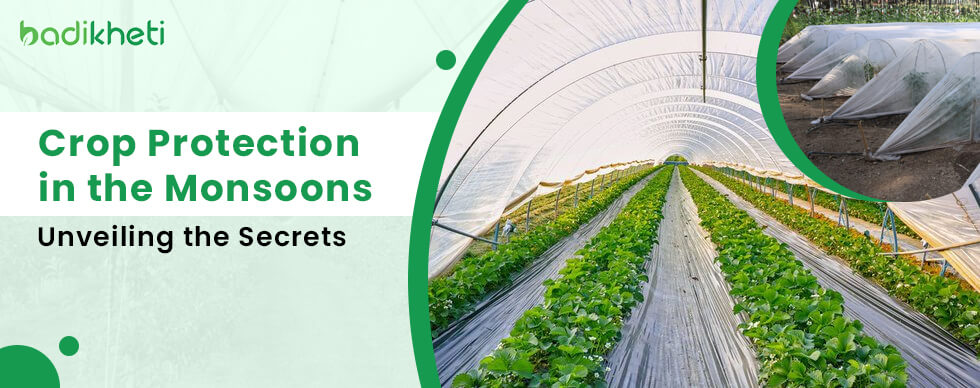
Monsoon is the seasonal change in the direction of winds that brings heavy rainfall to India. It is important for Indian farming because it provides water for irrigation, replenishes soil moisture, and influences crop production and prices. The rainy season also affects the livelihoods and food security of millions of farmers and consumers in India.
Monsoon is the season of heavy rainfall in India, which lasts from June to September. It is essential for the agriculture field because the monsoon provides natural water for irrigation and restocks the soil. However, the rainy season can also pose a big trouble for Indian farmers, if it is erratic, excessive, or deficient.
Erratic rainfall can bring floods or droughts that damage crops and farmers’ livelihoods. Excessive rains can result in waterlogging, soil erosion, and micro-organism invasion; on the other hand, deficient rains may result in low crop yield, substandard yield quality, and inflated prices in Indian agriculture marketplaces. Therefore, the monsoon is a double-edged sword for Indian farmers and the entire Indian agriculture sector because they depend on it for their survival and growth.
Agriculturists and expert farmers with years of experience suggest several steps to save your crops from this monsoon in India. You can follow each of them to assure that your hard-earned money and earnest efforts of sowing seeds and watering should not go in vain due to rain in any way.
Here are the steps or measures to be taken:
Waterlogging and fungal diseases are common threats to crops during heavy rainfall. One way to protect your crops from such threats is to select varieties that have a higher tolerance to excess water and lower susceptibility to fungal infections. You can buy quality seeds online from well-known brands and manufacturers at a renowned agriculture marketplace such as BadiKheti. This can help you reduce crop losses and maintain your yield quality.
Organic mulch is a layer of natural material that covers the soil surface. It can help protect your yields from the impact of heavy rainfall as it reduces soil erosion and suppresses weed growth. Soil erosion washes away nutrients and damages plant roots; on the other hand, weed growth eats up crops’ water and light quota with nutrients. By applying organic mulch, you can improve soil quality, conserve moisture, and enhance crop yield.
Waterlogging is a condition wherein the soil gets saturated with water, and hence it leaves no air space for plant roots to breathe. Excess water can damage crops by reducing oxygen availability, increasing disease risk, and leaching nutrients. One way to avoid waterlogging is to drain excess water from the fields using channels or pumps. This can improve soil aeration, reduce fungal infections, and preserve soil fertility.
Using drip irrigation techniques and watering with farming tools such as sprinklers are efficient methods of watering crops that can reduce water consumption and prevent soil erosion. Such irrigation helps farmers cope with heavy rains and other calamities that may cause flooding and harm to crops. By applying water directly to the roots or the foliage, drip irrigation and sprinklers can avoid runoff and waterlogging that may occur with traditional irrigation systems. Drip irrigation and sprinklers can also improve crop quality and yield by providing optimal moisture levels and preventing diseases and pests.
Extreme rains can increase the risk of pest infestation in crops, which can reduce yield and quality. One way to protect your crops from pests is to monitor their population and use biocontrol agents or organic pesticides when necessary.
Crop-protecting agents are natural enemies of pests, such as predators, parasites, or pathogens. Organic pesticides are derived from plants or minerals and have low toxicity to humans and the environment. Both methods can help reduce pest damage and maintain crop health without harming beneficial insects or pollinators.
With these precautions, you can sow and yield the best crop without worrying about the monsoon quagmires in India.
Introduction Chilli fondly known as "Mirchi" in Hindi holds great cultural and historical significance in India. It is not merely a culinary delight but an integral part of our traditions with significant links to agriculture and daily life. India takes great pride in being one of the leading producers and consumers of chillies globally, with various regions contributing to this spicy farming. This article aims to analyze the primary states involved in chilli cultivation within India, exploring their unique functions within the flourishing chilli industry....
The Indian economy is based on agriculture, and the farmer's livelihood relies on the rain in monsoon season. But it isn’t certain, so depending entirely on it may affect soil management and agricultural yields. Crops need a proper quantity of water for their development. The only means our farmers can keep storing and using water properly is via irrigation. In this blog, we will understand the irrigation methods for excellent water management for Indian farmers. Undoubtedly, the world’s agricultural area has increased in the past,...
Onions, also known as Pyaaz, or Kanda are the heart of India and are a lucrative cash crop for farmers here. If you’re looking to maximize onion seed growth and yields, there are certain farming practices that you have to consider. So, proper agricultural practices are critical to maximizing onion output and quality. For the best product, you must have quality onion seeds and proper agriculture equipment in place which you can buy from an online agriculture marketplace like BadiKheti. In this blog, we will...